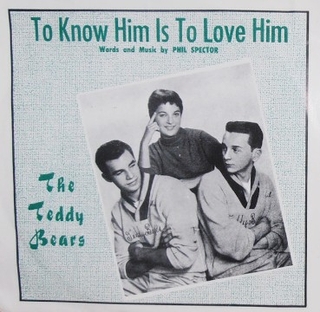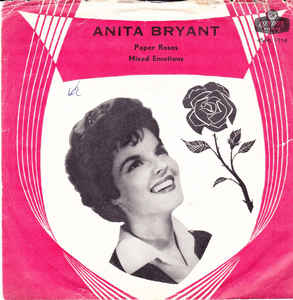Related Research Articles

"Wynken, Blynken, and Nod" is a poem for children written by American writer and poet Eugene Field and published on March 9, 1889. The original title was "Dutch Lullaby". The poem is a fantasy bed-time story about three children sailing and fishing among the stars from a boat which is a wooden shoe. The names suggest a sleepy child's blinking eyes and nodding head. The spelling of the names, and the "wooden shoe," suggest Dutch language and names, as hinted in the original title.
Walt Disney Records is an American record label of the Disney Music Group. The label releases soundtrack albums from The Walt Disney Company's motion picture studios, television series, theme parks, and traditional studio albums produced by its roster of pop, teen pop, and country artists.
"You Always Hurt the One You Love" is a pop standard with lyrics by Allan Roberts and music by Doris Fisher. First recorded by the Mills Brothers, whose recording reached the top of the Billboard charts in 1944, it was also a hit for Sammy Kaye in 1945.

"Pinball Wizard" is a song by the English rock band the Who, written by guitarist and primary songwriter Pete Townshend and featured on their 1969 rock opera album Tommy. The original recording was released as a single in 1969 and reached No. 4 in the UK charts and No. 19 on the U.S. Billboard Hot 100.
"Little Bitty Pretty One" is a 1957 song written and originally recorded by Bobby Day. The same year, the song was popularized by Thurston Harris. Produced by Aladdin Records, and featuring the Sharps on backing vocals, Harris's version reached No. 6 on the U.S. Billboard Best-Sellers chart and No. 2 on the R&B chart. The Bobby Day version reached No. 11 in the Canadian CHUM Chart.
"Mountain of Love" is a song written by Harold Dorman. Dorman released his version as a single in 1960. It was originally recorded in late 1959 at the Royal Recording Studios in Memphis before the backing vocals were overdubbed. It performed well, spending 19 weeks on the Billboard Hot 100 chart, peaking at No. 21 in May 1960, while reaching No. 7 on the Billboard Hot R&B Sides chart, and No. 25 on Canada's "CHUM Hit Parade". The song was his only top forty hit on the Billboard Hot 100 and was the highest-charting single of his career.
"Zip-a-Dee-Doo-Dah" is a song composed by Allie Wrubel with lyrics by Ray Gilbert for the Disney 1946 live action and animated movie Song of the South, sung by James Baskett. For "Zip-a-Dee-Doo-Dah", the film won the Academy Award for Best Original Song and was the second Disney song to win this award, after "When You Wish upon a Star" from Pinocchio (1940). In 2004, it finished at number 47 in AFI's 100 Years...100 Songs, a survey of top tunes in American cinema.
"Let's Get Together" is a song written by Robert and Richard Sherman for the 1961 Disney film The Parent Trap.
"Tall Paul" is a song recorded by Annette Funicello and written by the Sherman Brothers, along with Bob Roberts.
"You're Nobody till Somebody Loves You" is a popular song written by Russ Morgan, Larry Stock, and James Cavanaugh and published in 1944. The song was first recorded by Morgan and was a hit for him in 1946, reaching the No. 14 spot in the charts. The best known version was Dean Martin's, which was released in 1960 and reissued in 1964.

"To Know Him Is to Love Him" is a song written by Phil Spector, inspired by words on his father's tombstone, "To Know Him Was to Love Him." It was first recorded by the only vocal group of which he was a member, the Teddy Bears. Their recording spent three weeks at No. 1 on the Billboard Hot 100 chart in 1958, while reaching No. 2 on the UK's New Musical Express chart. Peter & Gordon and Bobby Vinton later had hits with the song, with its title and lyrics changed to "To Know You Is to Love You". In 1987, the song was resurrected by Dolly Parton, Linda Ronstadt, and Emmylou Harris, whose Trio recording topped the U.S. country singles chart.

"Wonderful! Wonderful!" is a song by American singer Johnny Mathis from his first greatest hits compilation, Johnny's Greatest Hits (1956). The song was written by Ben Raleigh and Sherman Edwards, while production was helmed by Mitch Miller. Columbia Records released it as the album's lead single on November 5, 1956. In the United States, the song peaked at number 14 on the Billboard charts.

"Paper Roses" is a popular song written and composed by Fred Spielman and Janice Torre. It first was a top five hit in 1960 for Anita Bryant. Marie Osmond recorded it in 1973 and took her version to number one on the US country chart.
"Jo Jo the Dog Faced Boy" was a novelty song made popular by Disney Mouseketeer, Annette Funicello. The song was written by Bob and Dick Sherman in collaboration with Los Angeles based songwriter Bob Roberts. "Jo Jo" was a follow-up to Annette's hit song "Tall Paul," which was the first rock and roll single by a female singer to reach the top ten. The Sherman Brothers went on to write the majority of Annette's early 1960s songs as well as winning two Oscars for Mary Poppins several years later.

"Bird Dog" is a song written by Boudleaux Bryant and recorded by the Everly Brothers. It was released in 1958 and was a no. 1 hit on the Billboard Country Chart for six weeks. The song also hit no. 2 on the U.S. Billboard Hot 100, as well as peaking at no. 2 for three weeks on the R&B charts.
"634-5789 " is a soul song written by Eddie Floyd and Steve Cropper. It was first recorded by Wilson Pickett on December 20, 1965 and included on his 1966 Atlantic Records album The Exciting Wilson Pickett with backing vocals by Patti LaBelle and the Blue Belles. The single reached number 1 on the Billboard Hot Rhythm & Blues Singles chart and number 13 on the Hot 100 singles chart.
"Baby Face" is a popular Tin Pan Alley jazz song. The music was written by Harry Akst, with lyrics by Benny Davis, and the song was published in 1926.
"Last Date" is a 1960 instrumental written and performed by Floyd Cramer. It exemplifies the "slip note" style of piano playing that Cramer made popular. It peaked at number 11 on the country chart and at number two on the Hot 100 behind "Are You Lonesome Tonight?" by Elvis Presley. Cramer's recording inspired a number of successful cover versions, including a vocal adaptation by Conway Twitty.

Johnny's Greatest Hits is a compilation album by vocalist Johnny Mathis that was released by Columbia Records on March 17, 1958, and has been described as the "original greatest-hits package". The LP collected all but one of the songs from the first six singles he recorded, including eight A- and B-sides that made the singles charts in The Billboard as well as three B-sides that did not chart and one new track that was co-written by Mathis but not released as a single.

The First 25 Years – The Silver Anniversary Album is a compilation album by American pop singer Johnny Mathis that was released in 1981 by Columbia Records. The back cover of the album notes that there are four new tracks. A cover of the Commodores hit "Three Times a Lady" had been released on the UK version of his 1980 album Different Kinda Different, which was retitled All for You, but the Mathis rendition of the song makes its US debut here.
References
- ↑ Price, Kathryn M. (2018). Walt Disney's Melody Makers: A Biography of the Sherman Brothers. Theme Park Press. p. 29. ISBN 978-1683901143.
- ↑ Whitburn, Joel (2013). Joel Whitburn's Top Pop Singles, 14th Edition: 1955-2012. Record Research. p. 39.
- ↑ "CHUM Hit Parade - October 10, 1960".